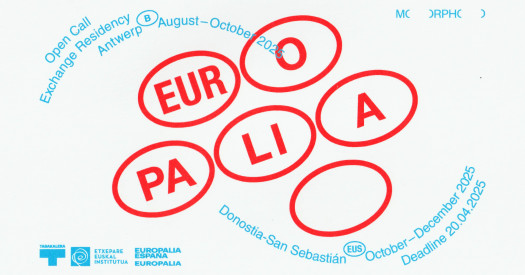
Exchange Residency EUROPALIA at Tabakalera
Tabakalera, EUROPALIA and MORPHO are delighted to continue their collaboration in 2025 with an international residency exchange. The arts festival EUROPALIA supports the participation of one artist from Belgium going to Tabakalera in the Basque Country for a three-month residency, in the framework of EUROPALIA ESPAÑA.
In exchange, MORPHO will host one artist from the Basque Country in Antwerp in the Fall of 2025, with the support of Tabakalera and the Basque Institute Etxepare.
Period
The residency for the Belgian artist in Donostia-San Sebastián, Basque Autonomous Community, lasts for 3 months, from 28 September until 21 December 2025.
For whom?
- This call is open to artists living in Belgium (residents and nationals).
- You are a visual artist, possibly with a transdisciplinary approach.
- You want to focus on artistic research and the development of your work in the company of peers.
- You are welcome regardless of age, ethnic-cultural background, gender diversity, neurodiversity, and more. See the accessibility guide at the bottom of this page.
- There is only room for 1 adult. You are welcome to contact us in advance to discuss your personal situation.
Tabakalera offers
- Accommodation with private double bedroom and bathroom in the Hotel One Shot Tabakalera House, placed in the building of Tabakalera, with a small working area in the bedroom with internet access with WiFi. The accommodation will also give access to a shared kitchen and living room.
- An individual studio space between 12.5sqm and 50sqm, with basic furniture, a nearby water supply, electrical power, lighting and internet access with WiFi. The studio will be assigned taking into account the characteristics of the selected project.
- Access to all resources of Tabakalera as well as to the collections and resources of Medialab.
- A programme of studio visits and an open studio presentation.
- Artistic guidance and practical assistance from the staff.
Financial support
Up to 500 euros round trip travel costs are covered. The residency also provides a 1,000 euros monthly fee and up to 500 euros project/production budget.